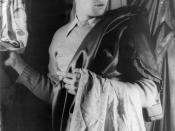What do you think about when you hear A Streetcar Named Desire? Many strong emotions are probably stirring up in your mind. Tennessee Williams, author of this fine drama, incorporated many of the same universal truths that were mentioned in William Faulkner's Nobel Prize acceptance speech. He said that all truths needed to be in the story for it to be a worthy one. By including these truths, a great story was created. In Tennessee Williams' A Streetcar Named Desire, the truths that had the most emotional meaning to me were pride, love, and pity.
In the drama, the chief truth was pride. Constantly in the play, Blanche shows pride for her possessions and luxuries. The other characters seem to notice her obsession for "expensive" clothing. Stanley made a comment saying, "Look at these feathers and furs that she come here to preen herself in! What's this here? A solid-gold dress, I believe! And this one! What is these here? Fox-pieces! Genuine fox fur-pieces, a half a mile long."
(Pg. 35) Also, she seems to get some of her self-esteem from the love letters by saying "these are love-letters, yellowing with antiquity, all from one boy." (Pg.41) Another example of pride in the drama is Stanley's self-pride. He is proud of his identity and his own well being even though Blanche calls him an uneducated Polack. Stanley responded to this put down by saying, "...but what I am is a one hundred percent American, born and raised in the greatest country on earth and proud as hell of it, so don't ever call me a Polack." (Pg. 110) Mitch also displays pride. He is proud of his stature and physique. He demonstrated this when he said to Blanche, " [my belly] is so hard now that a man...


